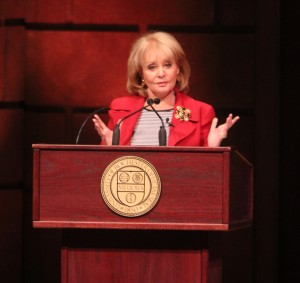
Junne Park, Photo Editor
By Leah Buletti and Melissa Goldin.
As one of the most iconic female journalists in history, Barbara Walters seems to have gleaned ample insight on life from the fact that, appropriately for a journalist, she seems much more comfortable asking the questions and soliciting information on the lives of others, rather than answering them or discussing her own.
Walters, who is currently the creator, co-host and executive producer of ABC’s “The View” and has interviewed every U.S. president since Richard Nixon in addition to a large span of famous world figures and celebrities, delivered a well-received Meliora Weekend keynote address consisting primarily of interview anecdotes tailored to the audience as opposed to speaking about her own life achievements on Saturday, Oct. 13 in Kodak Hall.
UR President Joel Seligman introduced Walters as the “journalist of our age” and a “gracious, thoughtful individual.” A short retrospective video of Walters’ life played after Seligman’s introduction, serving as an impressive reminder of the numerous interviews Walters has conducted. When Walters took the stage, she nostalgically said that watching the video had been a “trip down memory lane.” She recalled her “Today Show” days when, while living across from Carnegie Hall, the “ladies of the evening” would see her get into a limo and drive away.
“I gave them hope,” Walters said, to laughter. Then added, “I’m here to inspire you.”
The first interview Walters recounted was with Syrian President Bashar Hafez al-Assad, which was conducted in December 2011. Walters is the only American to have interviewed Assad since the crisis began in Syria.
In her interview, she showed Assad pictures of people being tortured and said that, even then, he denied the atrocities.
Assad said that the country is moving forward with reforms and that free elections are on the horizon.
“Of course, we’ve seen none of that,” Walters said.
Walters described Assad as “disconnected”— he said “‘it’s not me, it’s my government and I said, you are the government,’” Walters recalled.
Walters then moved into a discussion of her interview with President Barack Obama, first explaining her attempts to have former Governor Mitt Romney on “The View” and saying, to audience laughter, that she hoped they would therefore understand why she was just talking about Obama.
Then she stated that she wanted students to know that it is not essential to know what you’re going to do in the future — Obama thought he might want to be an architect or a baseball player, but never expected to become president.
Walters then noted how different and important the role of women is in this year’s presidential campaign, commenting on how the wives of both candidates made speeches at the first presidential debate and how much this has changed over time.
Walters then moved into discussing Bill Clinton, who “represents to me the choices you have to make,” Walters said, discussing Clinton’s relationship with his wife Hillary with admiration and a deep sense of respect. She used the Clintons’ relationship as a segue into her belief in the need to live life as though it is a gift, to learn as you go and to love, learning what is important to you when things get difficult.
“I don’t make predictions, but I’m going to,” Walters then said with calm certainty. “I think she’ll run for president in four years.”
After a brief mention of Colin Powell, Walters went on to discuss “a different kind of leader” — her experience with a man she described as “considered by many as a god, a man without a country, a man who calls himself a teacher” — none other than the Dalai Lama, who claims that “the purpose of the life is to be happy and you find happiness through compassion and warm-heartedness,” qualities which can be attained by eliminating “all negative thoughts and feelings of competition.”
For about three days after the interview, Walters recounted, eliciting laughter from the audience, she gave the Dalai Lama’s advice a try.
“I moved away from all negative thoughts, I stopped competing for any interviews, I smiled a great deal, I was never jealous, I was never competitive, I was very warm-hearted,” she said. “I was also very bored.”
Ultimately, Walters did take the Dalai Lama’s advice to heart though.
“Compassion and warm-heartedness — those are the secrets to happiness,” she assured the crowd.
In describing an interview with Britain’s first and only female prime minister, Margaret Thatcher, famously nicknamed the
“Iron Lady,” Walters touched on another view of leadership — or rather, the lack thereof.
Walters described the moment when Thatcher was ousted from her own party as “a terrible shock for her.”
Thatcher’s story includes an important lesson, Walters said.
“I try to remember myself when I’m high up how easy it is … to fail,” she said, so it’s possible to “continue to enjoy your life when you’re no longer the prime minister, the anchor, the president.”
Walters then moved away from politics to talk about Christopher Reeve, known for his portrayal of Superman in 1978 and who became a quadriplegic after an equestrian accident. As she spoke about Reeve, who she described as “the most extraordinary man I’ve ever met,” a somber feeling overtook the crowd.
Walters lifted the audience back out of this ambiance as she described Reeve as when he was in the hospital, unable to move, unable to live the life he once had. She explained how a man who appeared to be a doctor came in and told Reeve to turn over.
“Reeve was getting more and more agitated until he took a good look at the man and realized it was Robin Williams,” Walters said to laughter.
Williams did more that day than simply visit a friend.
“Reeve said that when he looked at Williams as a proctologist he started to laugh and he thought, ‘if I can laugh, I can live,’” Walters recounted.
Walters concluded her address with a few notes of advice for the audience: do something that gives you meaning in life, cherish your friends and have something beyond yourself, however you define it, religiously or otherwise, to believe in.
“Not everyone can be a hero, but we can aspire to be,” she said. Not everyone can lead a country … nor is it vital to be a leader. But there are some qualities of leadership that any of us can strive to live up to.”
The keynote address ended with a question and answer session between Seligman and Walters, which centered on Walters’ view of the state of network news , which Walters said she thinks has changed “enormously.”
She explained how the content of the news itself has changed based on the preferences of viewers — hardly anyone seems to want the hard news anymore, prefering it to be lighter, more cheerful and more fun.
Walters was positive about the progress in network news’ receptiveness toward women, which she has had a large hand in advancing since her career took off in the 1960s.
“If I’m proud of anything, that’s the legacy I’m proud of,” she said.
Buletti and Goldin are members of the class of 2013.





